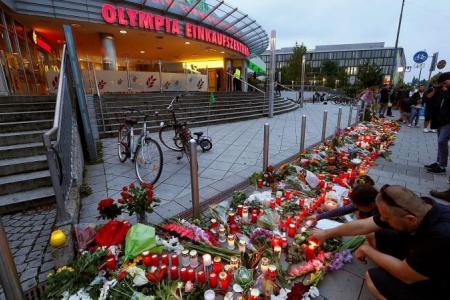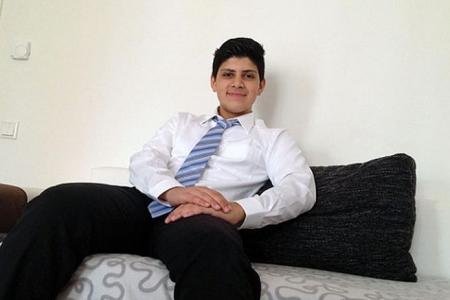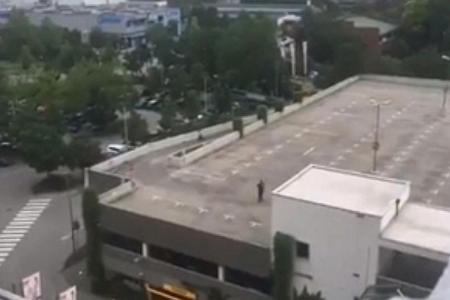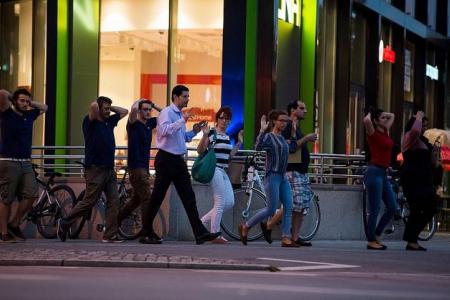Anti-social media
Friday's Munich mall shooting that ended with the death of 10 people, including the shooter, highlights the dual role of social media in today's reality
Social networks were a curse and a blessing in the deadly shopping mall shooting in Munich, Germany, last Friday.
The 18-year-old gunman, a German-Iranian named David Ali Sonboly, used the Internet to plan and carry out his crime in which he killed nine people and wounded 27 others.
German police, however, sometimes found themselves chasing fictitious leads and false alarms on social media.

SOCIAL MEDIA LURE
Sonboly, who had been planning the shooting for a year, set up a fake Facebook account in May, stealing the profile of a real user and sending out invitations to lure people to a fast-food restaurant.
He used the name Selina Akim and posted this message before the attack: "Come today at 4 o'clock to McDonald's at OEZ (shopping centre). I am giving away anything you want as long as it's not too expensive."
It is unclear who fell for the ruse, but one acquaintance had warned young people to stay clear, reported UK's The Telegraph.
"This here is a fake account of one Ali Sonboly. Don't get your hopes up," wrote Lukas Dore.
"The boy is psychologically disturbed and only wants attention."
Sonboly, who was born in Germany, later opened fire in the shopping mall before killing himself.
Among those he killed were a group of four children aged 14 and 15. They were shot at the table where they were eating.
He went on a rampage in an apparent revenge attack for being bullied by those of "Turkish and Arab" origin who had picked on him in school, reported The Telegraph.
SOCIAL MEDIA CONFUSION
As soon as the terrifying events started to unfold on Friday afternoon, Munich's police were quick to take to Twitter to try to keep the public informed about the confusing and fast-evolving situation.
"We're working as fast as we can to apprehend the attackers," they tweeted in German, English and French.
"The suspects are still on the run. Please avoid public places. #munich #gunfire.
"Unconfirmed reports of more violence and possible #gunfire in the city centre. Situation is unclear. Please avoid public areas."
SOCIAL MEDIA FICTION
But as social network users began to tweet and re-tweet their own experiences and versions of events, it rapidly became difficult for the police to retain an overview and, in some cases, differentiate between fact and fiction.
At one point, for example, there were a flurry of reports of another shooting in the city centre, on the pedestrianised square called Stachus.
But those reports turned out to be false.
Another headache for police were eyewitness accounts, photos and videos that were rapidly being uploaded onto the Internet.
Police were concerned that the attackers - at that point, they believed there could have been more than one - could track where officers were being deployed and in what numbers, making it easier to avoid them.
In the end, the police desperately tweeted: "Please don't take photos or video of police action in order to avoid giving away helpful information for the suspects."
Munich Police chief Hubertus Andrae told ZDF public television on Saturday that the speed and volume of information that needed to be verified was "challenging."

SOCIAL MEDIA FACT
The official Twitter account proved useful in keeping the public informed about the latest confirmed facts, such as the number of victims or the time and place of the next press conference.
Interior Minister Thomas de Maiziere told a news conference: "Nowadays, in the age of social networks, it is no longer the police who have control over the quantity and timing of the release of information, but everyone.
"There are sometimes advantages in that, as can be seen in the number of investigations that have been brought to a successful conclusion thanks to photos and videos taken by private individuals."
This here is a fake account of one Ali Sonboly. Don't get your hopes up. The boy is psychologically disturbed and only wants attention.
- Lukas Dore, who warned young people not to fall for the ruse.
WITNESS ACCOUNT: 'Teen asked for my help'
A witness to the Munich shooting, Mr Huseyin Bayri, said he was riding his bike outside the restaurant when he saw the attacker yelling.
"I heard a scream at first: 'You ******... foreigners. I am German. You will get it,'" CNN reported Mr Bayri as saying.
"And then the first shots were fired. And a boy of about 14 or 17 years of age... collapsed, fell to the floor."
Mr Bayri said he jumped off his bike, crawled towards the wounded boy and hid next to him. He pressed on the boy's gunshot wounds to stop the bleeding.
"The boy asked for my help. I tried to talk with him, asked him his name, his age, if he had a girlfriend," he said.
"I tried to make sure he looked at me, that his eyes were open."
The teen pleaded with Mr Bayri to call an ambulance, but died before it arrived.
Germany to review gun laws

Senior German officials yesterday called for a review of Germany's already strict gun laws after Friday's shooting in Munich in which a gunman killed nine people before killing himself.
"Gun control is an important issue. We must continue to do all we can to limit and strictly control access to deadly weapons," German Vice-Chancellor Sigmar Gabriel, leader of the Social Democrats, told media group Funke Mediengruppe.
Mr Gabriel said German authorities were investigating how the German-Iranian teen gained illegal access to the 9mm Glock 17 pistol despite signs that he had significant psychological issues.
DISCUSS
"We will have to discuss in the near future about whether the current gun control laws are sufficient," said German lawmaker Stephan Mayer, a spokesman for German Chancellor Angela Merkel's ruling conservatives in Parliament, in a statement yesterday.
"The biggest priority is to combat the illegal arms trade since that could also reduce crime and terrorism." - Reuters
Get The New Paper on your phone with the free TNP app. Download from the Apple App Store or Google Play Store now





